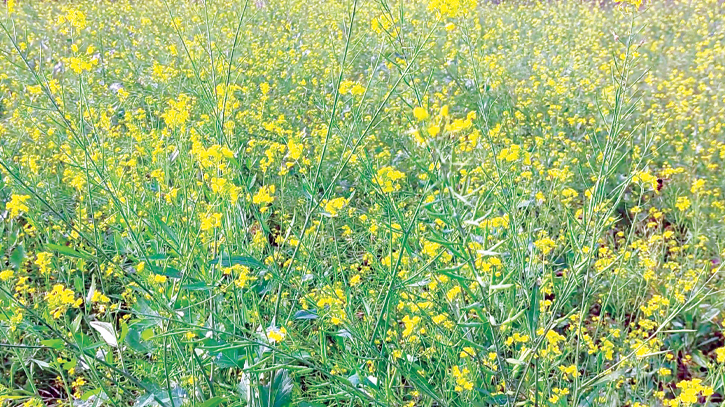
Photo : Messenger
In the past five fiscal years, mustard cultivation has surged in four upazilas of Chuadanga district to meet the growing demand for edible oil, particularly through incentive programs. Farmers in these areas have increasingly opted to plant mustard in the gap between Aman and Boro paddy seasons, anticipating favorable yields.
Responding to the increased interest, farmers are advocating for expanding the incentive scheme to encompass more participants and offer higher rewards for mustard cultivation. According to data from the Chuadanga Agricultural Extension Department for the fiscal year 2023-2024, mustard cultivation covered 310 hectares in Chuadanga Sadar Upazila, 2,485 hectares in Alamdanga Upazila, 310 hectares in Damurhuda Upazila, and 410 hectares in Jibannagar Upazila. A significant number of farmers in these areas received financial incentives for their mustard cultivation efforts.
Notably, farmers have predominantly favored Tori-7, Bari-9, Bari-13, and Bari-14 mustard varieties, which typically take 85 to 90 days to mature. Agricultural experts like Amirul Haque, an Assistant Agriculture Officer in Chuadanga Sadar Upazila, highlight the region's conducive soil conditions for mustard cultivation, projecting promising yields ranging from 3 to 9 tons per bigha, depending on the variety.
Individual farmers, such as Taju, Azizul, and Fazlu, share their experiences and expectations, indicating the profitability of mustard cultivation on fallow lands. They express optimism about future prospects and the importance of governmental support in scaling up production.
Officials like Bivas Chandra Saha, Deputy Director of Chuadanga Agricultural Extension Department, acknowledge the positive trend in mustard cultivation, attributing it to government incentives and ongoing efforts to promote the crop. They stress the potential for increased oil production domestically, thereby reducing reliance on costly imports.
Additionally, the government has implemented various measures and provided support to farmers, aiming to enhance coordination and maximize yields. Different varieties of mustard yield varying amounts of oil upon crushing, with Desi mustard yielding 250-300 grams per kg and Bari-8 to 14 varieties yielding 430-500 grams per kg.
Overall, mustard cultivation not only utilizes fallow lands effectively but also contributes to meeting the local demand for edible oil. Farmers believe that further expansion of incentive programs and broader participation could significantly boost edible oil production in Chuadanga district.
Messenger/Fardin








